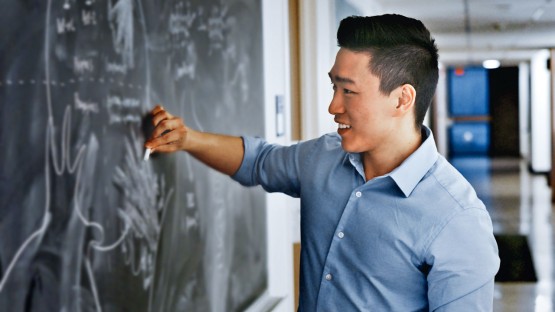In a seminar room in the Physical Sciences Building last fall, Brian Lee ’20 delivered a short lecture on cancer research at CURBx – the Cornell Undergraduate Research Board’s TED-style talks. He packed a thesis-full of detail into a few minutes.
Lee’s enthusiasm never waned as he spoke on improving immunotherapy and chemotherapy. In fact, his CURB poster – showing how immunotherapeutics can interact more optimally with conventional cancer treatments – won the biology category’s top prize.
A biology major in the College of Agriculture and Life Sciences when he arrived at Cornell in August 2016, Lee wanted to be a high school teacher. “I wanted to impact other people’s lives,” he said.
But in his second semester, Lee joined the laboratory of Dr. Kristy Richards ’90, associate professor of biomedical sciences in the Cornell College of Veterinary Medicine. He added the molecular and cellular biology concentration to his major, and took most of the molecular and cell biology courses the college offered.
“The classes started feeding into my research and my research started feeding into my classes,” he said. “In my classes, I wondered, ‘What are we going to find out today?’ and ‘What can I use in my research work?’ It made me more excited and deeper into lab [work].”
As a junior, Lee began teaching a weekly course for teaching assistants in biology. He also started volunteering at Cayuga Medical Center’s chemotherapy suite.
Richards noticed that Lee enjoyed absorbing biology, conducting research and working with patients. “Kristy was supportive,” he said. “Instead of [me] becoming a teacher, she suggested the physician-scientist route.”
He took her suggestion to heart and decided on a medical research career path.
In the spring of 2019, Lee knew that Richards had been ill, but didn’t know the extent of her illness. The night before spring break, Lee sent her an email. “I sent her my findings – and suggested something about watching ‘The Avengers,’ because she was a Marvel fan,” he said, “and I told her, ‘I hope you’re doing well.’”
Lee never got a response: Richards died of breast cancer the next day. She was 50.
“I canceled my spring break and stayed in my room,” he said. “Someone who helped me to this point, who advocated for me, who helped me to find my passion for what I wanted to do for the rest of my life … was gone.
“I cried a lot,” Lee said.
Lee had often stopped by Richards’ office to share data. “She would talk to me for one or two hours. Her love for conducting laboratory work was contagious. It spilled on to me. Here at Cornell, she was like a second mom to me.”
Lee resumed his research last fall in the laboratory of Avery August, professor of microbiology and immunology in the College of Veterinary Medicine. This semester, however, the COVID-19 pandemic interrupted it.
After the pandemic is over, Lee said, he will complete the current research and will attend medical school before embarking on a medical research career.
“I am hopeful for a career where I still can make an impact,” Lee said. “Kristy Richards showed me how science guides our passions for our work – passions that I didn’t know I had.”















